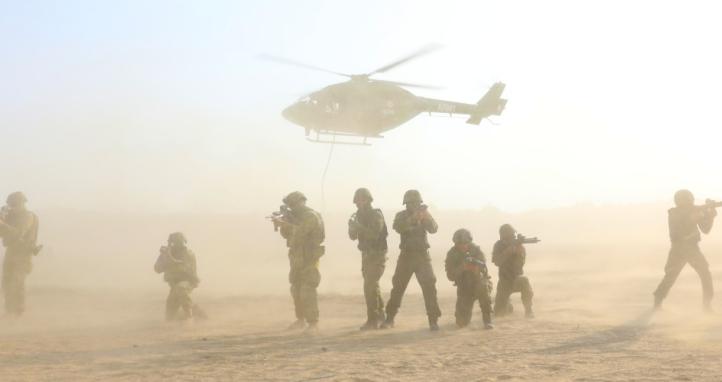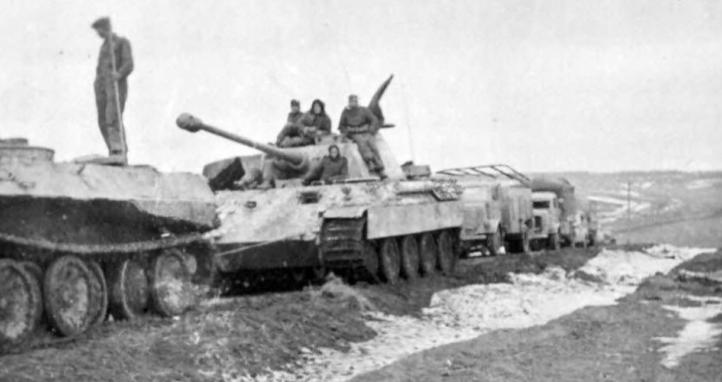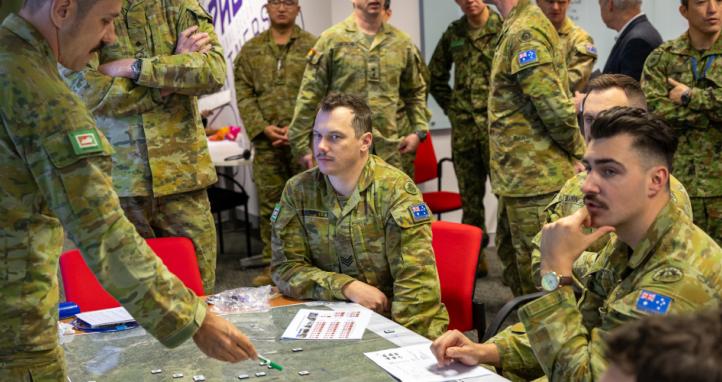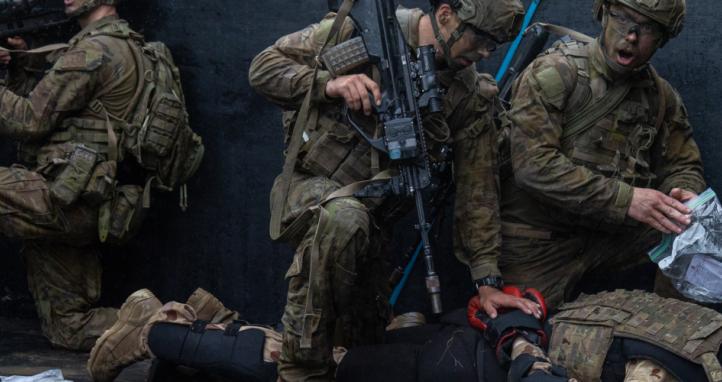Facts and figures
| Official name | Republic of Fiji |
| Country code | FJ |
| Area | 18,272km2 |
| Coastline | 1,129km |
| Population | 896,444 |
| Capital city | Suva |
| Timezone | UTC+12:00 |
| GDP | $USD 5.49 billions |
| Currency | FJD (Fijian dollar $) |
| Government type | Parliamentary Republic |
| Notable people |
|
The 'Know Your Region' series is designed to support unit and individual professional military education on the South East Asian region. It's important for all serving members of our military to have a foundational knowledge of the countries and issues in the Indo-Pacific.
FIJI – INFORMATION
On this page:
- Summary
- Culture & Demographics
- National Psyche
- Public Diplomacy and Public Affairs
- Communications and Technology
Summary
Fiji is an archipelago of more than 300 islands and over 500 islets comprising a total land mass of approximately 18,300 sq km. Located within the South Pacific, the islands are situated on the border of Melanesia and Polynesia and are scattered across an area of approximately 2.6 million sq km. Of the islands, approximately 100 are inhabited. Fiji has no immediate island neighbours and Tonga is the closest neighbour, approximately 745km away, followed by Vanuatu and New Caledonia. The following video provides an introduction to Fiji.
The population of Fiji is approximately 900,000, and of the total land mass, 87% remains under tribal ownership. The largest of the Fijian islands, Viti Levu, meaning ‘Great Fiji’ is home to two thirds of the population. The capital city, Suva, is located on Viti Levu and is home to the Fijian Parliament and government. The second most populous island in Fiji is Vanua Levu which has a population of around 130,000. The remainder of the Fijian population is spread across the inhabited islands. The following video provides some facts about Fiji:
Culture & Demographics
The first known inhabitants of Fiji date back 3,500 years and are thought to have come from other countries in Melanesia. The original inhabitants were tribal, and the islands were ruled under semi-autonomous tribal chiefdoms. Europeans discovered Fiji in the mid-1600s, and further explorers arrived in the 1700s, including Captain William Bligh from Great Britain. In the 1800s, European, Indians and British people arrived through different ventures. Among the new settlers were Christian missionaries. The Fijians, who still practised cannibalism at the time, are said to have killed and eaten one of the missionaries, Thomas Baker, as this video explains.
British colonial rule followed in 1874, and Fiji remained under British rule until its independence in October 1970. The following two videos provide a quick history and some interesting facts about the country:
The primary language of Fiji is English, followed by Fijian and Hindi. While Fijians originally practised traditional religions based upon divination and animism, once Christian missionaries began to settle in Fiji, Christianity slowly began to spread and today over 60% of Fijians are Christian. The remainder of the population practice Hinduism (28%) and Islam (6%), and a small minority practice Sikhism and Buddhism.
In Fiji the traditional gender-based roles remain a way of life in the tribal villages and rural areas. The men remain the primarily breadwinners and are expected to care for the women. Fijian women are the primary caregivers in the home, focussing on the family and working with other women within the community to raise children, and to support and maintain village or tribal community life. Within this structure, women have influence and power within the village, and are respected for their knowledge and experience. Through their leadership within the community, and the support of NGOs, Fijian women are becoming more empowered, and this video gives one woman’s insights on gender equality and her vision for the future:
Violence against women is of concern in Fiji. The Fijian Government has approved laws and acts to support women impacted by violence, including preventative measures to stop repeated violent behaviour. This is supported locally through police and NGO initiatives, as well as internationally with, for example, support from Australia and the UN.
For more information on Fijian culture and demographics, see the resources below:
- Videos
- Podcasts
- Articles:
- The CIA World Factbook: Fiji
- Fiji High Commission UK: Summary of culture, history and demographics
- Fiji: History, Culture, Demographics, Politics and much more
- A Brief History of Cannibalism in Fiji
- Religion in Fiji: Important Facts and Figures
- DFAT: Fiji Country Report
- UN Women: Asia and the Pacific - Fiji
National Psyche
Fijian identity is drawn from the traditional tribal community way of life: working together for the benefit of the group rather than self. While urban, modern communities may differ, traditionally Fijians have a shared approach to working, living and raising children. The definition of family is not simply of those related by blood, but of those belonging to the village and / or tribal community. There is little concept or time for materialism; and plenty of time to focus on ’kerekere’ meaning a willingness to support and provide for others without expectation of any kind of return.
Nationally, sport has also helped shape some of modern Fiji’s identity. Rugby Union is the official national sport, and all forms of rugby are played. Fiji won gold at the Tokyo Olympics in Rugby Sevens. Playing sport at a competitive national and international level can help young Fijians bring about social and economic improvement to both their family and their community – working again for the benefit of the group, not the individual.
For more information on Fijian national psyche, see the articles below:
- Videos
- Articles
- National traditions of Fiji. Habits, mentality and the way of living
- Fiji’s sevens triumph is symbolic of their ‘work together, love one another’ spirit
- SBS Cultural Atlas: Fiji
- Living abroad in Fiji: The Sensual Rhythms of Native Life
- In Fiji, mindset is changing amid work to prevent violence against women
- A Tartan Clan in Fiji: Narrating the Coloniser ‘Within’ the Colonised
Public Diplomacy and Public Affairs
Fiji has adopted the ‘New Pacific Diplomacy’ which is the assertive diplomacy of the nations within the Pacific to empower themselves as one, to shape, influence, support and have their needs met in a global forum. This is often through one of the Pacific groups such as the Pacific Island Forum. Fiji sees itself as a leader of Pacific Island nations and not as dependent upon the larger powers of Australia and New Zealand. In the years following the 2006 coup, and prior to the 2014 election, Fiji expanded its diplomatic ties. Prior to 2009 Fiji had a diplomatic relationship with 70 countries; but by 2013 this number had almost doubled.
This ANU publication explains in detail The New Pacific Diplomacy.
Fiji is a leader on climate diplomacy within the region and has engaged in global forums, influencing where it can, the impact of climate change from larger, more powerful states, whose emissions have the most impact upon global warming. This video gives further insight into Fiji’s efforts regarding climate change:
Through its official website, the Fijian Government informs its regional and international community of its strategic economic focus, including its budgetary requirements, national development and any contemporary issues impacting the nation. The Ministry of Foreign Affairs website provides all government press releases where details of diplomatic activities can be found.
For more information on Fijian diplomacy and public affairs, see the resources below.
- Videos
- Articles
- Parliament of the Republic of Fiji
- The Fijian Government Media Centre – Fiji Focus - 2021
- MOFA: Fiji press releases and publications
- The Fijian Government
- 'Sacrificial canary': Fiji warns Australia not to let Pacific sink
- Fiji - Australia’s commitment to strengthening climate and disaster resilience in the Pacific
Communications and Technology
There are two main organisations which provide domestic and international telecommunication services in Fiji. One of which, Digicel, is the main provider for several Pacific Island nations. The other is state-owned ATH.
Fiji’s radio stations include state-owned commercial ‘Fiji Broadcasting Cooperation’; and the main Fijian television station is ‘Fiji TV’. Current data shows that there are approximately 600,000 users of the Internet in Fiji and roughly the same amount who use social media. The government has exercised control over both traditional more recent media such as the Internet and has in the past been being accused of reducing the freedom of access to online information. Fiji has not been immune to the growth in false media stories or ‘fake news’, or ill-use of the Internet, and consequently, the government has introduced acts to protect its people, as further explained in this article:
For more information on Fijian Communications and Technology, see the articles below:
- Controlling the internet in Fiji
- ICT to Fiji
- Digital 2021: Fiji
- Australian taxpayers could help buy Pacific arm of telecommunications giant Digicel to stop China from nabbing it first
Discussion Questions
- Fiji is making great inroads to reduce the high numbers of domestic violence cases within its communities. Is there hope that further improvements can be made, or are cultural practices too prohibitive for substantive change to be made? Should women play a greater role in Fiji’s national discourse? How can Australia assist Fiji in this regard?
- Fiji’s last major coup was in 2006, and since then the political scene has remained relatively stable, with Fiji expanding its diplomatic relations. Is the culture of coups over in Fiji, or could another coup occur in the future? What might be the triggers for such an event? What impact might such an event have, and what role should Australia play in assisting Fiji to maintain its current political stability?
- Fiji has become a major regional advocate for action on climate change, becoming part of various forums and advocate bodies. Does Fiji have enough influence in the region to be heard by larger nations? What actions should Fiji undertake to increase its influence? Where does Australia fit into Fiji’s climate change activities?
Know your region
Know Your Region series gives you a shortcut to understanding other nations in the Indo-Pacific region.









